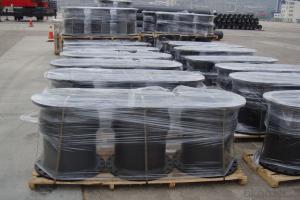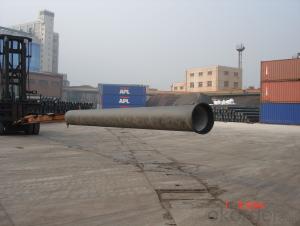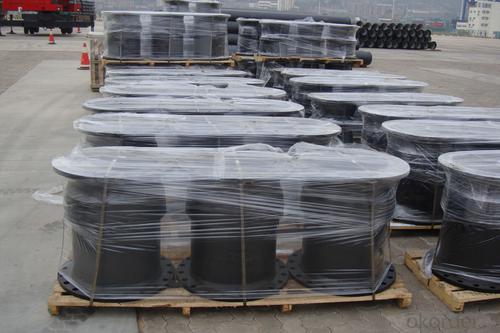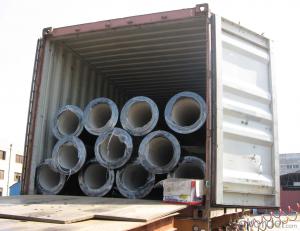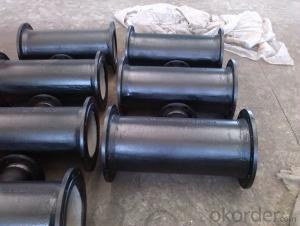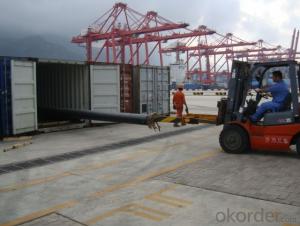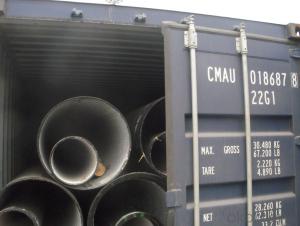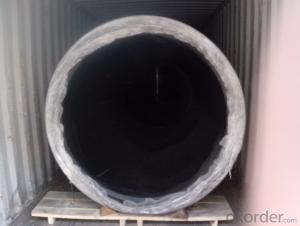DUCTILE IRON PIPE C Class DN 600
- Loading Port:
- Tianjin
- Payment Terms:
- TT OR LC
- Min Order Qty:
- -
- Supply Capability:
- 30000Tons m/month
OKorder Service Pledge
OKorder Financial Service
You Might Also Like
CNBM ductile iron pipe ranges from DN80-DN1600mm (T-Type, Class K9), effective length 6m, comply with ISO2531 Standard
Company Profile
CNBM International Corporation is the leading production base and renowned supplier of Ductile Iron Water Pipe systems of both potable and waste water in China. We are constantly looking to develop high quality products to ensure the longest service life and wonderful performance.
CNBM Pipelines regard quality as the essential factor leading to successful business. Every pipe is tested in accordance with BS EN545 (water application) or BS EN598 (sewer application). CNBM Pipelines products comply with and are tested according to the relevant European and International Standards. Our pipes are manufactured under the quality management system BS EN ISO 9001. After years of efforts, CNBM Pipelines has built up great reputation in terms of quality and service among customers worldwide
Product Introduction
CNBM ductile iron pipe ranges from DN80-DN1600mm (Tyton, T-Type, Class K7/K8/K9), effective length: 6m, complying with BS EN545/EN598/ISO2531/BS4772.
Specification& Payment terms
Internal lining: Pipes shall have an internal cement mortar lining in acc with ISO4179.
External coating: Pipes shall be externally coated with metallic zinc spray plus a further layer of resin painting to ISO8179.
Gasket: 100% SBR/NBR/EPDM gasket in accordance with ISO4633.
Packing: Pipes from DN100 to DN300 be bundled with steel belts, the others are in bulk.
Payment term: By 30% T/T advance payment + 70% Irrevocable L/C at sight.
Packing: In bulk vessel or in container.
- Q: What are the different methods for joining ductile iron pipe?
- There exists a variety of methods to join ductile iron pipe, each possessing its own advantages and limitations. One commonly utilized technique is the mechanical joint (MJ) coupling, where a rubber gasket, bolts, and nuts are employed to establish a watertight seal between pipe sections. This method is comparatively swift and straightforward to install, although it necessitates the expertise of a skilled technician to ensure proper alignment and bolt tightening to prevent leakage. Another approach is the flanged joint, which involves equipping the pipe ends with flanges that are fastened together using gaskets to form a secure seal. This method permits easy disassembly and reassembly of pipe sections, making it suitable for applications requiring frequent maintenance or alterations. However, it is more costly and time-consuming when compared to other methods. A widely employed method is the push-on joint (POJ), wherein a rubber gasket and a special lubricant are utilized to slide the pipe ends together. This technique yields a reliable and watertight seal, and installation is relatively rapid and simple. However, it necessitates proper alignment and cautiousness to prevent damage to the gasket during assembly. An alternative option is the restrained joint (RJ), which utilizes a mechanical joint coupling with additional features to resist axial forces or thrusts. This method is commonly employed in applications where the pipe is subjected to internal pressure, external loads, or seismic activity. It offers a secure and rigid connection but may require specialized tools and training for installation. Lastly, welding is another method for joining ductile iron pipe. This involves heating the pipe ends and melting a filler metal to create a permanent bond. Welding provides a strong and durable connection, but it demands skilled welders and additional time for preparation, welding, and cooling. It is often employed for specific applications, such as joining sections of pipe with different diameters or connecting to other materials. In conclusion, the various methods for joining ductile iron pipe encompass mechanical joint coupling, flanged joint, push-on joint, restrained joint, and welding. The selection of the method relies on factors such as application requirements, installation time, maintenance needs, and budget.
- Q: An urban infrastructure construction, water supply pipe is ductile iron pipe and PE pipe, thank you
- Because the construction of municipal water supply pressure will be relatively large, generally used in the selection of pipe centrifugal ductile iron pipe, he has properties of iron essence and steel, excellent corrosion resistance, good ductility, good sealing effect, simple installation, ductile iron pipe is mainly used for municipal, industrial and mining enterprises, water supply, gas, oil etc.
- Q: Are ductile iron pipes suitable for installation in areas with high traffic loads?
- Yes, ductile iron pipes are suitable for installation in areas with high traffic loads. Due to their inherent strength and durability, ductile iron pipes can withstand heavy loads and are commonly used in applications where there is significant vehicular traffic.
- Q: How does ductile iron pipe handle traffic loads and vibrations?
- Ductile iron pipe is well-equipped to handle traffic loads and vibrations due to its inherent strength and durability. The material properties of ductile iron, such as its high tensile strength and impact resistance, make it a reliable choice for withstanding heavy loads and vibrations caused by traffic. When subjected to traffic loads, ductile iron pipe has the ability to distribute the weight effectively, minimizing stress concentrations and potential damage. This is due to its flexible nature, which allows it to absorb and dissipate the forces exerted by traffic, preventing cracks or fractures from forming. Moreover, ductile iron pipe's ability to dampen vibrations is another advantage. Its high density and stiffness help to absorb and dissipate the energy generated by vibrations, reducing their impact on the pipe and surrounding infrastructure. This is crucial in areas with heavy traffic or construction activities, where vibrations can be common. Furthermore, ductile iron pipes are often designed and manufactured to meet industry standards and specifications, ensuring they can withstand the anticipated traffic loads and vibrations. These pipes are commonly used in water distribution systems, sewers, and underground infrastructure, where they are subjected to various dynamic loads and vibrations. In summary, ductile iron pipe is an excellent choice for handling traffic loads and vibrations due to its strength, flexibility, and ability to dampen vibrations. Its reliable performance under these conditions makes it a preferred material for infrastructure projects, ensuring long-term durability and minimal impact on the pipe's structural integrity.
- Q: How can the connection of ductile iron pipe elbow be convenient for connecting?
- The groove connecting pipe consists of two categories of products: sealing function of pipe connections with rigid joint, flexible joint, mechanical three and groove flange; the pipe connections transition of elbow, three links, four links, different diameter pipe, blind plate etc..
- Q: Can ductile iron pipe be used for road and highway crossings?
- Yes, ductile iron pipe can be used for road and highway crossings. Ductile iron is a strong and durable material that is well-suited for underground infrastructure projects, including road and highway crossings. It provides excellent resistance to heavy loads, corrosion, and external forces, making it suitable for withstanding the traffic and environmental conditions associated with road and highway crossings. Additionally, ductile iron pipe is available in various sizes and strengths, allowing for customization based on the specific requirements of the crossing. Proper installation techniques and adherence to relevant industry standards are essential to ensure the longevity and performance of ductile iron pipes in road and highway crossings.
- Q: Which direction should the spigot of the K9 ductile iron pipe be installed?
- Ductile iron pipes mainly called centrifugal ductile iron pipe, it has the properties of nature, iron and steel, excellent corrosion resistance, good ductility, good sealing effect, simple installation, mainly for municipal, industrial and mining enterprises, water supply, gas, oil etc.. Water supply pipe is the first choice, with high cost performance.
- Q: Can ductile iron pipes be used for fire protection systems?
- Fire protection systems can utilize ductile iron pipes. Ductile iron, a form of cast iron, possesses both strength and flexibility, making it suitable for various applications, including fire protection systems. It boasts excellent mechanical properties, such as high tensile strength and impact resistance, which are essential for withstanding the pressures and stresses that can arise during fire suppression efforts. Ductile iron pipes are renowned for their durability and long lifespan, which is crucial for reliable and functional fire protection systems. They have a longer lifespan compared to materials like PVC or galvanized steel and are less susceptible to corrosion. This is particularly important for fire protection systems, as they must remain operational even after extended periods of inactivity. Additionally, ductile iron pipes exhibit exceptional fire resistance. They can withstand high temperatures without compromising their structural integrity, ensuring the fire protection system remains intact and functional during fire emergencies. This is pivotal for ensuring the safety of occupants and minimizing property damage. Furthermore, ductile iron pipes are compatible with a wide range of fittings, valves, and accessories commonly used in fire protection systems. This facilitates easy installation and integration into existing fire suppression networks. In conclusion, ductile iron pipes are a reliable and suitable choice for fire protection systems due to their strength, durability, fire resistance, and compatibility with other system components.
- Q: Can ductile iron pipes be used in areas with high levels of heavy metal contamination?
- Areas with high levels of heavy metal contamination can indeed utilize ductile iron pipes. Ductile iron, known for its strength and durability, is resistant to corrosion, thus making it ideal for various environmental conditions, including those with heavy metal contamination. The structural integrity and performance of ductile iron pipes remain unaffected by the presence of high levels of heavy metals in the surrounding soil or water. These pipes feature a protective lining, typically made of cement mortar or polyethylene, which acts as a barrier between the pipe and its environment. This lining effectively prevents the leaching of heavy metals into the flowing water. Moreover, ductile iron pipes have demonstrated exceptional resistance to chemical corrosion, including that caused by heavy metals. Consequently, they have been extensively used in industrial settings where heavy metal contamination is prevalent, such as wastewater treatment plants, industrial facilities, and mining sites. However, it is crucial to emphasize the importance of regular monitoring and maintenance for ductile iron pipes, even though they can withstand high levels of heavy metal contamination. These measures ensure that the protective lining remains intact and any potential issues are promptly addressed. In conclusion, ductile iron pipes are a suitable choice for areas with substantial heavy metal contamination. Their strength, durability, and resistance to corrosion make them a reliable option for transporting water and other fluids, even in challenging environments.
- Q: Can ductile iron pipe be used for underground applications?
- Indeed, underground applications can employ ductile iron pipe. Renowned for its robustness and endurance, ductile iron pipe proves to be well-suited for a multitude of underground uses, including water and sewage systems, gas pipelines, and irrigation systems. Its exceptional resistance to corrosion and external burdens renders it a dependable selection for underground installations, where sustained functionality and structural soundness are pivotal considerations. Moreover, ductile iron pipe's pliability enables it to endure ground shifting and settling sans fracturing or shattering, making it an apt choice for regions susceptible to seismic occurrences.
Send your message to us
DUCTILE IRON PIPE C Class DN 600
- Loading Port:
- Tianjin
- Payment Terms:
- TT OR LC
- Min Order Qty:
- -
- Supply Capability:
- 30000Tons m/month
OKorder Service Pledge
OKorder Financial Service
Similar products
Hot products
Hot Searches
Related keywords
